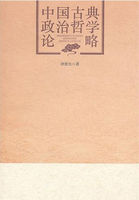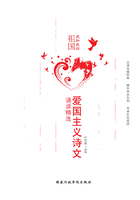These are the properties of the rational soul:it sees itself,analyses itself,and makes itself such as it chooses;the fruit which it bears itself enjoys-for the fruits of plants and that in animals which corresponds to fruits others enjoy-it obtains its own end,wherever the limit of life may be fixed.Not as in a dance and in a play and in such like things,where the whole action is incomplete,if anything cuts it short;but in every part and wherever it may be stopped,it makes what has been set before it full and complete,so that it can say,I have what is my own.And further it traverses the whole universe,and the surrounding vacuum,and surveys its form,and it extends itself into the infinity of time,and embraces and comprehends the periodical renovation of all things,and it comprehends that those who come after us will see nothing new,nor have those before us seen anything more,but in a manner he who is forty years old,if he has any understanding at all,has seen by virtue of the uniformity that prevails all things which have been and all that will be.This too is a property of the rational soul,love of one's neighbour,and truth and modesty,and to value nothing more more than itself,which is also the property of Law.Thus then right reason differs not at all from the reason of justice.
Thou wilt set little value on pleasing song and dancing and the pancratium,if thou wilt distribute the melody of the voice into its several sounds,and ask thyself as to each,if thou art mastered by this;for thou wilt be prevented by shame from confessing it:and in the matter of dancing,if at each movement and attitude thou wilt do the same;and the like also in the matter of the pancratium.In all things,then,except virtue and the acts of virtue,remember to apply thyself to their several parts,and by this division to come to value them little:and apply this rule also to thy whole life.
What a soul that is which is ready,if at any moment it must be separated from the body,and ready either to be extinguished or dispersed or continue to exist;but so that this readiness comes from a man's own judgement,not from mere obstinacy,as with the Christians,but considerately and with dignity and in a way to persuade another,without tragic show.
Have I done something for the general interest? Well then I have had my reward.Let this always be present to thy mind,and never stop doing such good.
What is thy art? To be good.And how is this accomplished well except by general principles,some about the nature of the universe,and others about the proper constitution of man?
At first tragedies were brought on the stage as means of reminding men of the things which happen to them,and that it is according to nature for things to happen so,and that,if you are delighted with what is shown on the stage,you should not be troubled with that which takes place on the larger stage.For you see that these things must be accomplished thus,and that even they bear them who cry out "O Cithaeron." And,indeed,some things are said well by the dramatic writers,of which kind is the following especially:-
Me and my children if the gods neglect,This has its reason too.
And again-We must not chale and fret at that which happens.
And Life's harvest reap like the wheat's fruitful ear.
And other things of the same kind.
After tragedy the old comedy was introduced,which had a magisterial ******* of speech,and by its very plainness of speaking was useful in reminding men to beware of insolence;and for this purpose too Diogenes used to take from these writers.
But as to the middle comedy which came next,observe what it was,and again,for what object the new comedy was introduced,which gradually sunk down into a mere mimic artifice.That some good things are said even by these writers,everybody knows:but the whole plan of such poetry and dramaturgy,to what end does it look!
How plain does it appear that there is not another condition of life so well suited for philosophising as this in which thou now happenest to be.
A branch cut off from the adjacent branch must of necessity be cut off from the whole tree also.So too a man when he is separated from another man has fallen off from the whole social community.Now as to a branch,another cuts it off,but a man by his own act separates himself from his neighbour when he hates him and turns away from him,and he does not know that he has at the same time cut himself off from the whole social system.Yet he has this privilege certainly from Zeus who framed society,for it is in our power to grow again to that which is near to us,and be to come a part which helps to make up the whole.However,if it often happens,this kind of separation,it makes it difficult for that which detaches itself to be brought to unity and to be restored to its former condition.Finally,the branch,which from the first grew together with the tree,and has continued to have one life with it,is not like that which after being cut off is then ingrafted,for this is something like what the gardeners mean when they say that it grows with the rest of the tree,but that it has not the same mind with it.
As those who try to stand in thy way when thou art proceeding according to right reason,will not be able to turn thee aside from thy proper action,so neither let them drive thee from thy benevolent feelings towards them,but be on thy guard equally in both matters,not only in the matter of steady judgement and action,but also in the matter of gentleness towards those who try to hinder or otherwise trouble
thee.For this also is a weakness,to be vexed at them,as well as to be diverted from thy course of action and to give way through fear;for both are equally deserters from their post,the man who does it through fear,and the man who is alienated from him who is by nature a kinsman and a friend.
There is no nature which is inferior to art,for the arts imitate the nature of things.But if this is so,that nature which is the most perfect and the most comprehensive of all natures,cannot fall short of the skill of art.Now all arts do the inferior things for the sake of the superior;therefore the universal nature does so too.And,indeed,hence is the origin of justice,and in justice the other virtues have their foundation:for justice will not be observed,if we either care for middle things (things indifferent),or are easily deceived and careless and changeable.
If the things do not come to thee,the pursuits and avoidances of which disturb thee,still in a manner thou goest to them.Let then thy judgement about them be at rest,and they will remain quiet,and thou wilt not be seen either pursuing or avoiding.
The spherical form of the soul maintains its figure,when it is neither extended towards any object,nor contracted inwards,nor dispersed nor sinks down,but is illuminated by light,by which it sees the truth,the truth of all things and the truth that is in itself.
Suppose any man shall despise me.Let him look to that himself.But I will look to this,that I be not discovered doing or saying anything deserving of contempt.Shall any man hate me? Let him look to it.But I will be mild and benevolent towards every man,and ready to show even him his mistake,not reproachfully,nor yet as ****** a display of my endurance,but nobly and honestly,like the great Phocion,unless indeed he only assumed it.For the interior parts ought to be such,and a man ought to be seen by the gods neither dissatisfied with anything nor complaining.For what evil is it to thee,if thou art now doing what is agreeable to thy own nature,and art satisfied with that which at this moment is suitable to the nature of the universe,since thou art a human being placed at thy post in order that what is for the common advantage may be done in some way?
Men despise one another and flatter one another;and men wish to raise themselves above one another,and crouch before one another.
How unsound and insincere is he who says,I have determined to deal with thee in a fair way.-What art thou doing,man? There is no occasion to give this notice.It will soon show itself by acts.The voice ought to be plainly written on the forehead.Such as a man's character is,he immediately shows it in his eyes,just as he who is beloved forthwith reads everything in the eyes of lovers.The man who is honest and good ought to be exactly like a man who smells strong,so that the bystander as soon as he comes near him must smell whether he choose or not.But the affectation of simplicity is like a crooked stick.Nothing is more disgraceful than a wolfish friendship (false friendship).Avoid this most of all.The good and ****** and benevolent show all these things in the eyes,and there is no mistaking.
As to living in the best way,this power is in the soul,if it be indifferent to things which are indifferent.And it will be indifferent,if it looks on each of these things separately and all together,and if it remembers that not one of them produces in us an opinion about itself,nor comes to us;but these things remain immovable,and it is we ourselves who produce the judgements about them,and,as we may say,write them in ourselves,it being in our power not to write them,and it being in our power,if perchance these judgements have imperceptibly got admission to our minds,to wipe them out;and if we remember also that such attention will only be for a short time,and then life will be at an end.Besides,what trouble is there at all in doing this? For if these things are according to nature,rejoice in them,and they will be easy to thee:but if contrary to nature,seek what is conformable to thy own nature,and strive towards this,even if it bring no reputation;for every man is allowed to seek his own good.
Consider whence each thing is come,and of what it consists,and into what it changes,and what kind of a thing it will be when it has changed,and that it will sustain no harm.
If any have offended against thee,consider first:What is my relation to men,and that we are made for one another;and in another respect,I was made to be set over them,as a ram over the flock or a bull over the herd.But examine the matter from first principles,from this:If all things are not mere atoms,it is nature which orders all things:if this is so,the inferior things exist for the sake of the superior,and these for the sake of one another.
Second,consider what kind of men they are at table,in bed,and so forth:and particularly,under what compulsions in respect of opinions they are;and as to their acts,consider with what pride they do what they do.
Third,that if men do rightly what they do,we ought not to be displeased;but if they do not right,it is plain that they do so involuntarily and in ignorance.For as every soul is unwillingly deprived of the truth,so also is it unwillingly deprived of the power of behaving to each man according to his deserts.Accordingly men are pained when they are called unjust,ungrateful,and greedy,and in a word wrong-doers to their neighbours.
Fourth,consider that thou also doest many things wrong,and that thou art a man like others;and even if thou dost abstain from certain faults,still thou hast the disposition to commit them,though either through cowardice,or concern about reputation,or some such mean motive,thou dost abstain from such faults.
Fifth,consider that thou dost not even understand whether men are doing wrong or not,for many things are done with a certain reference to circumstances.And in short,a man must learn a great deal to enable him to pass a correct judgement on another man's acts.
Sixth,consider when thou art much vexed or grieved,that man's life is only a moment,and after a short time we are all laid out dead.
Seventh,that it is not men's acts which disturb us,for those acts have their foundation in men's ruling principles,but it is our own opinions which disturb us.Take away these opinions then,and resolve to dismiss thy judgement about an act as if it were something grievous,and thy anger is gone.How then shall I take away these opinions? By reflecting that no wrongful act of another brings shame on thee:
for unless that which is shameful is alone bad,thou also must of necessity do many things wrong,and become a robber and everything else.
Eighth,consider how much more pain is brought on us by the anger and vexation caused by such acts than by the acts themselves,at which we are angry and vexed.
Ninth,consider that a good disposition is invincible,if it be genuine,and not an affected smile and acting a part.For what will the most violent man do to thee,if thou continuest to be of a kind disposition towards him,and if,as opportunity offers,thou gently admonishest him and calmly correctest his errors at the very time when he is trying to do thee harm,saying,Not so,my child:we are constituted by nature for something else:I shall certainly not be injured,but thou art injuring thyself,my child.-And show him with gentle tact and by general principles that this is so,and that even bees do not do as he does,nor any animals which are formed by nature to be gregarious.And thou must do this neither with any double meaning nor in the way of reproach,but affectionately and without any rancour in thy soul;and not as if thou wert lecturing him,nor yet that any bystander may admire,but either when he is alone,and if others are present...
Remember these nine rules,as if thou hadst received them as a gift from the Muses,and begin at last to be a man while thou livest.But thou must equally avoid flattering men and being veied at them,for both are unsocial and lead to harm.And let this truth be present to thee in the excitement of anger,that to be moved by passion is not manly,but that mildness and gentleness,as they are more agreeable to human nature,so also are they more manly;and he who possesses these qualities possesses strength,nerves and courage,and not the man who is subject to fits of passion and discontent.For in the same degree in which a man's mind is nearer to ******* from all passion,in the same degree also is it nearer to strength:and as the sense of pain is a characteristic of weakness,so also is anger.For he who yields to pain and he who yields to anger,both are wounded and both submit.
But if thou wilt,receive also a tenth present from the leader of the Muses (Apollo),and it is this-that to expect bad men not to do wrong is madness,for he who expects this desires an impossibility.But to allow men to behave so to others,and to expect them not to do thee any wrong,is irrational and tyrannical.
There are four principal aberrations of the superior faculty against which thou shouldst be constantly on thy guard,and when thou hast detected them,thou shouldst wipe them out and say on each occasion thus:this thought is not necessary:this tends to destroy social union:this which thou art going to say comes not from the real thoughts;for thou shouldst consider it among the most absurd of things for a man not to speak from his real thoughts.But the fourth is when thou shalt reproach thyself for anything,for this is an evidence of the diviner part within thee being overpowered and yielding to the less honourable and to the perishable part,the body,and to its gross pleasures.
Thy aerial part and all the fiery parts which are mingled in thee,though by nature they have an upward tendency,still in obedience to the disposition of the universe they are overpowered here in the compound mass (the body).And also the whole of the earthy part in thee and the watery,though their tendency is downward,still are raised up and occupy a position which is not their natural one.In this manner then the elemental parts obey the universal,for when they have been fixed in any place perforce they remain there until again the universal shall sound the signal for dissolution.Is it not then strange that thy intelligent part only should be disobedient and discontented with its own place? And yet no force is imposed on it,but only those things which are conformable to its nature:still it does not submit,but is carried in the opposite direction.For the movement towards injustice and intemperance and to anger and grief and fear is nothing else than the act of one who deviates from nature.
And also when the ruling faculty is discontented with anything that happens,then too it deserts its post:for it is constituted for piety and reverence towards the gods no less than for justice.For these qualities also are comprehended under the generic term of contentment with the constitution of things,and indeed they are prior to acts of justice.
He who has not one and always the same object in life,cannot be one and the same all through his life.But what I have said is not enough,unless this also is added,what this object ought to be.For as there is not the same opinion about all the things which in some way or other are considered by the majority to be good,but only about some certain things,that is,things which concern the common interest;so also ought we to propose to ourselves an object which shall be of a common kind (social) and political.For he who directs all his own efforts to this object,will make all his acts alike,and thus will always be the same.
Think of the country mouse and of the town mouse,and of the alarm and trepidation of the town mouse.
Socrates used to call the opinions of the many by the name of Lamiae,bugbears to frighten children.
The Lacedaemonians at their public spectacles used to set seats in the shade for strangers,but themselves sat down anywhere.
Socrates excused himself to Perdiccas for not going to him,saying,It is because I would not perish by the worst of all ends,that is,I would not receive a favour and then be unable to return it.
In the writings of the Ephesians there was this precept,constantly to think of some one of the men of former times who practised virtue.
The Pythagoreans bid us in the morning look to the heavens that we may be reminded of those bodies which continually do the same things and in the same manner perform their work,and also be reminded of their purity and nudity.For there is no veil over a star.
Consider what a man Socrates was when he dressed himself in a skin,after Xanthippe had taken his cloak and gone out,and what Socrates said to his friends who were ashamed of him and drew back from him when they saw him dressed thus.
Neither in writing nor in reading wilt thou be able to lay down rules for others before thou shalt have first learned to obey rules thyself.Much more is this so in life.
A slave thou art:free speech is not for thee.And my heart laughed within.And virtue they will curse,speaking harsh words.To look for the fig in winter is a madman's act:such is he who looks for his child when it is no longer allowed.
When a man kisses his child,said Epictetus,he should whisper to himself,"To-morrow perchance thou wilt die."-But those are words of bad omen.-"No word is a word of bad omen," said Epictetus,"which expresses any work of nature;or if it is so,it is also a word of bad omen to speak of the ears of corn being reaped."
The unripe grape,the ripe bunch,the dried grape,all are changes,not into nothing,but into something which exists not yet.
No man can rob us of our free will.Epictetus also said,A man must discover an art (or rules) with respect to giving his assent;and in respect to his movements he must be careful that they be made with regard to circumstances,that they be consistent with social interests,that they have regard to the value of the object;and as to sensual desire,he should altogether keep away from it;and as to avoidance (aversion) he should not show it with respect to any of the things which are not in our power.
The dispute then,he said,is not about any common matter,but about being mad or not.
Socrates used to say,What do you want? Souls of rational men or irrational?-Souls of rational men.-Of what rational men? Sound or unsound?-Sound.-Why then do you not seek for them?-Because we have them.-Why then do you fight and quarrel?














